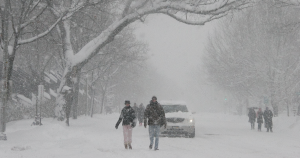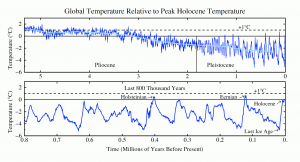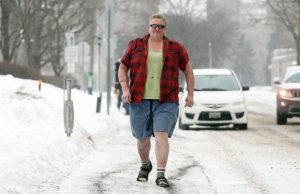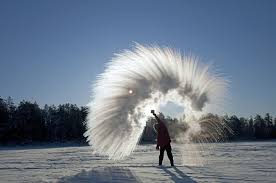The weather in Winnipeg is normally quite stable. We typically have four days of sun followed by  four days of cloud. Of course, locally, Winnipeggers respond to their climatic conditions like any others. They complain that the day is hot, cold, or too temperate, even while they make claims about the wild swings of temperature or mood. “If you don’t like the weather,” they say, “wait fifteen minutes.”
four days of cloud. Of course, locally, Winnipeggers respond to their climatic conditions like any others. They complain that the day is hot, cold, or too temperate, even while they make claims about the wild swings of temperature or mood. “If you don’t like the weather,” they say, “wait fifteen minutes.”
This is not really true, and they have borrowed the phrase and the sentiment from places in Canada where the weather is truly constantly shifting, such as the Gulf of Saint Lawrence, or coastal British Columbia. Because there are few influences on the weather in Winnipeg, and on southern Manitoba in general, the people here are rarely surprised by freak storms, by forecasting that is wildly at variance to what they see outside, or—even given a trend toward warmer winters in the last twenty years—temperature shifts.
influences on the weather in Winnipeg, and on southern Manitoba in general, the people here are rarely surprised by freak storms, by forecasting that is wildly at variance to what they see outside, or—even given a trend toward warmer winters in the last twenty years—temperature shifts.
CBC radio has grown wise to the tendency of forecasting that looks ahead too much to be inaccurate, so they now limit their foretelling to one to two days. This morning I heard a forecast that should have been exactly like all the others from a winter morning, some small amount of snow, minus figures, and the continuation of that into the future. As usual, the anchor-person announced the current temperature as minus six degrees and followed that with the day’s high temperature: minus eight.
This stood out, and for the first time I wondered what they actually meant by peak temperature. I had always presumed that it referred to the highest temperature  during the day, much like peak meters on a stereo will show the highest levels the song rises to. I now wonder if they are using peak instead to refer to a particular time of the day. Perhaps they take the time normally associated with higher temperatures, such as noon, and then call that the peak and whatever temperature they guess it will be at that time is the day’s peak temperature.
during the day, much like peak meters on a stereo will show the highest levels the song rises to. I now wonder if they are using peak instead to refer to a particular time of the day. Perhaps they take the time normally associated with higher temperatures, such as noon, and then call that the peak and whatever temperature they guess it will be at that time is the day’s peak temperature.
To do this, they have to modify our generally accepted notion of peak and highest. I could be wrong, however, and they are instead referring to the peak of the day and giving the temperature then. Either way, it is much warmer in the morning than it will be later in the day, and the radio has told me that by claiming—if we take them at their words—that minus eight is warmer than minus six.
That is the other way we survive the Winnipeg winter. We tell ourselves that winter will end  earlier than it will, we lie about how the cold doesn’t parch our bones even while we shiver next to a bus stop, and we wear shorts as soon as the temperature approaches zero. In Winnipeg we survive by telling lies about our terrible situation, not just about how our weather is unpredictable, or that the winter is more manageable than it is, that summer is too hot when in fact it is temperate, but we have begun to lie about what the words mean.
earlier than it will, we lie about how the cold doesn’t parch our bones even while we shiver next to a bus stop, and we wear shorts as soon as the temperature approaches zero. In Winnipeg we survive by telling lies about our terrible situation, not just about how our weather is unpredictable, or that the winter is more manageable than it is, that summer is too hot when in fact it is temperate, but we have begun to lie about what the words mean.
Caught in the desperate fact of our winter existence, we lie about which temperature is colder, and what the word peak might mean. While the rest of  the world looks on in amazement while we throw boiling water into the air and it sublimes into vapour, we have also begun to tinker with the building blocks of communication itself.
the world looks on in amazement while we throw boiling water into the air and it sublimes into vapour, we have also begun to tinker with the building blocks of communication itself.
